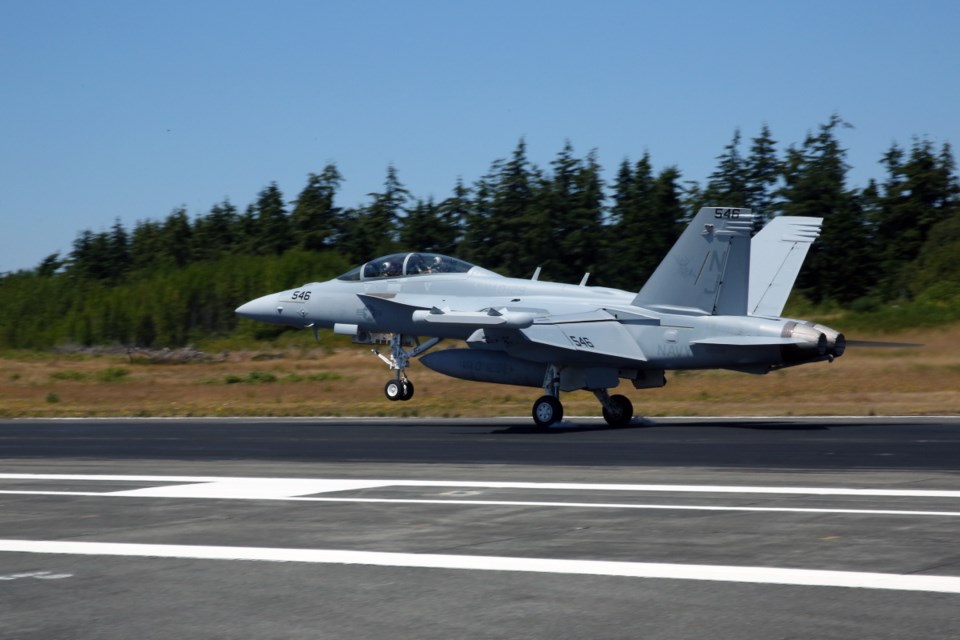 News item: A U.S. navy plan to expand its fleet of EA-18G jets at Whidbey Island could mean Victorians will be hearing more of The Rumbles.
News item: A U.S. navy plan to expand its fleet of EA-18G jets at Whidbey Island could mean Victorians will be hearing more of The Rumbles.
The Rumbles from the U.S. are increasing, literally and figuratively.
The ones we have grown used to, sort of, over the past eight years sound like rolling thunder, or a big truck lumbering past, or the beginning of an earthquake, or God bowling.
When The Rumbles first began to draw notice back in 2008, Victorians of a certain generation just assumed them to be the brown acid from Woodstock coming back for a visit, so would put on some Pink Floyd and go lie down until the noise went away.
But when the periodic perturbations persisted, puzzled people began looking for another source, which turned to be the Growlers — aircraft whose electronic-attack arsenal is used to jam the enemy’s radar and otherwise mess up its communications — at the Whidbey Island Naval Air Station near the mouth of Puget Sound.
The timing (the planes were introduced in 2008) was consistent with when we began hearing The Rumbles, and the location (50 kilometres southeast of Victoria, across the open water) matched the areas — Oak Bay, the east side of the Saanich Peninsula — where they were most commonly heard. Atmospherics were blamed for carrying the noise of jet engines powering up and practising take-offs and landings.
The Rumbles have continued, off and on, ever since. So have The Grumbles from those who are put off by the noise. Vancouver Islanders might be more accepting of the disturbances were they the sound of orcas breaching or puppies being born or Justin Trudeau ripping his shirt off, but that’s not the case. The Rumbles are not only the sound of planes but of U.S. electronic-warfare jets, which is some kind of Trumpian trifecta for those whose internal air raid sirens are triggered by any combination of A) Uncle Sam B) ominous Big Brother technology and C) the military.
Right now, Canadian alarm systems are particularly sensitive because of the other Rumbles heard from ’Merica, the figurative ones that got really loud Nov. 8.
Post-election headlines across the Great White-Knuckled North posed the fearful question What Does It Mean to Us?
“Can Canada escape Donald Trump’s NAFTA crosshairs unscathed?” asked Global. “Is Donald Trump’s victory emboldening hate-mongers in Canada?” wondered the Globe and Mail. “Canada roadkill under Trump?” quavered the Toronto Sun. (The Times Colonist, hyper-local as always, weighed in with “Vic West boy wins trip to Esquimalt.”)
Right off the hop we heard that Trump’s Trade Police want to go after Canada over softwood lumber again. Really? Didn’t we already lose that one? Learning that the Americans want to refight the softwood lumber war is like being the Confederacy and hearing the Union wants a rematch at Gettysburg.
Then John Manley, the head of the Business Council of Canada, began freaking out aloud about what will happen (hint: it’s bad) if American corporations do as Trump wants and take home the $27 billion they have parked in Canadian financial institutions. Legitimate fear but jeez, John, did you have to remind them? It’s like standing in a dark alley and declaring: “I hope nobody takes all these hundreds I have stuffed in my wallet.”
On and on the worries go: NATO, security, beef exports. Our oil and gas industry fusses that Trump’s desire to ramp up exploration in the U.S. is a competitive threat to drilling in Canada, while our enviros fear climate change will be relegated to the bottom of the presidential priority list, sandwiched somewhere between International Women’s Day and Cinco de Mayo.
Even if the White House doesn’t specifically target Canada, our economies are linked. (Just look at the Black Friday phenomenon, where Canadian retailers have been forced to ape an American shopping blitz built around the U.S. Thanksgiving holiday, a day off that we don’t get.) Our butt is tied to their piano. If it goes over the cliff, we follow like Wile E. Coyote.
“Living next to you is in some ways like sleeping with an elephant,” Pierre Trudeau told the U.S. in 1969. “No matter how friendly and even-tempered is the beast, if I can call it that, one is affected by every twitch and grunt.”
Right now, we’re not so sure about the “friendly and even-tempered” bit. So, as always, Canadians squirm at the ominous Rumbles from the south, whether they come from Whidbey Island or Washington, D.C.



